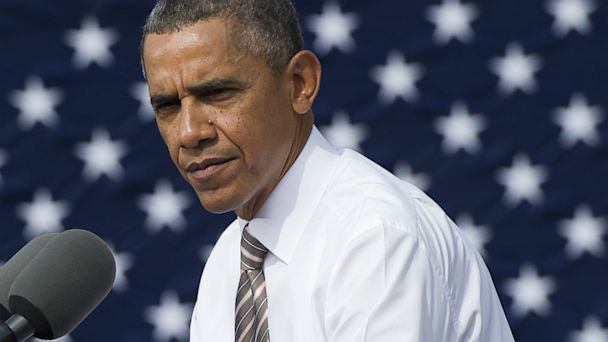Obama Doesn't Rule Out Using 14th Amendment To Raise The Debt Limit

SAUL LOEB/AFP/Getty Images
With the October 17 deadline to raise the debt limit rapidly approaching, President Obama is not specifically ruling out using the 14th Amendment to increase the nation's borrowing ability if the political impasse continues and Congress fails to do so, but says "I don't expect to get there."
"There is one way to make sure that America pays its bills, and that's for Congress to authorize the Secretary of the Treasury, Jack Lew, to pay bills that they have already accrued," the president told The Associated Press in an interview Friday that was released this morning.
"I'm pretty willing to bet that there are enough votes in the House of Representatives right now to make sure that the United States doesn't end up being a deadbeat. The only thing that's preventing that from happening is Speaker Boehner calling the vote," he said.
The White House has long maintained that "this administration does not believe that the 14th Amendment gives the power to the president to ignore the debt ceiling," as White House Press Secretary Jay Carney said on Thursday. "We do not believe that the 14th Amendment provides that authority to the president."
Pressed about whether he would be willing to take unilateral action to prevent default, the president told the AP that the hopes the fight doesn't get to that point.
Four days into the government shutdown, the president reiterated to the Associated Press that he is not going to make concessions on his signature health care law or negotiate with House Republicans until they agree to reopen the government and raise the nation's debt ceiling.
"The only thing that is keeping that from happening is Speaker Boehner has made a decision that he is going to hold out to see if he can get additional concessions from us," Obama told the Associated Press' Julie Pace.
"What I've said to him is we are happy to negotiate on anything," he continued. "But what we can't do is keep engaging in this sort of brinksmanship where a small faction of the Republican Party ends up forcing them into brinksmanship to see if they can somehow get more from negotiations by threatening to shut down the government or threatening America not paying its bills."
The president went on to criticize some Tea Party Republicans for seeking out controversy.
"I recognize that in today's media age, being controversial, taking controversial positions, rallying the most extreme parts of your base - whether it's left or right - is a lot of times the fastest way to get attention or raise money, but it's not good for government. It's not good for the people we're supposed to be serving," he said.